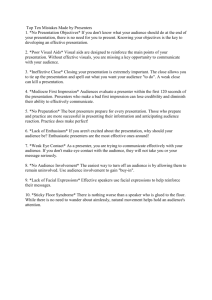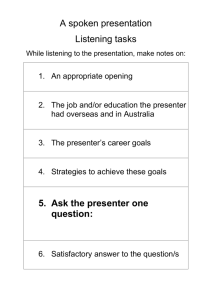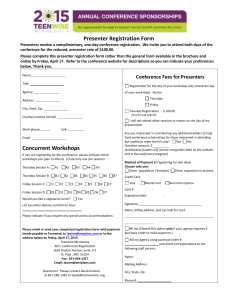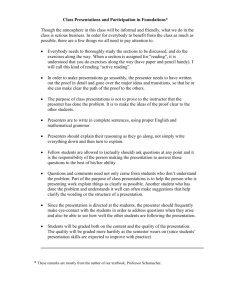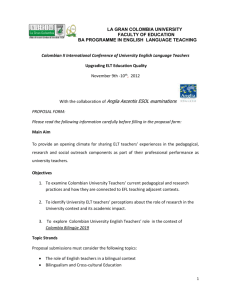Session Descriptions
advertisement
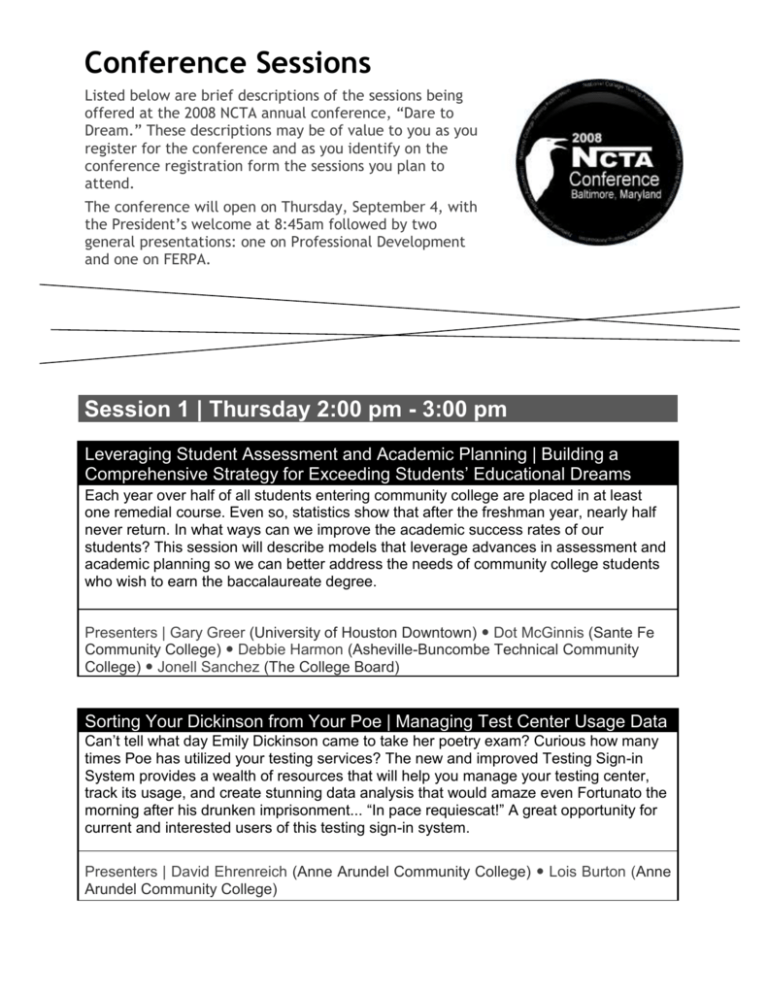
Conference Sessions Listed below are brief descriptions of the sessions being offered at the 2008 NCTA annual conference, “Dare to Dream.” These descriptions may be of value to you as you register for the conference and as you identify on the conference registration form the sessions you plan to attend. The conference will open on Thursday, September 4, with the President’s welcome at 8:45am followed by two general presentations: one on Professional Development and one on FERPA. Session 1 | Thursday 2:00 pm - 3:00 pm Leveraging Student Assessment and Academic Planning | Building a Comprehensive Strategy for Exceeding Students’ Educational Dreams Each year over half of all students entering community college are placed in at least one remedial course. Even so, statistics show that after the freshman year, nearly half never return. In what ways can we improve the academic success rates of our students? This session will describe models that leverage advances in assessment and academic planning so we can better address the needs of community college students who wish to earn the baccalaureate degree. Presenters | Gary Greer (University of Houston Downtown) Dot McGinnis (Sante Fe Community College) Debbie Harmon (Asheville-Buncombe Technical Community College) Jonell Sanchez (The College Board) Sorting Your Dickinson from Your Poe | Managing Test Center Usage Data Can’t tell what day Emily Dickinson came to take her poetry exam? Curious how many times Poe has utilized your testing services? The new and improved Testing Sign-in System provides a wealth of resources that will help you manage your testing center, track its usage, and create stunning data analysis that would amaze even Fortunato the morning after his drunken imprisonment... “In pace requiescat!” A great opportunity for current and interested users of this testing sign-in system. Presenters | David Ehrenreich (Anne Arundel Community College) Lois Burton (Anne Arundel Community College) Developing a Customized Web-based Placement Test Using a model from biology to illustrate the process, this session will explain how to develop a customized web-based placement test that is reliable and cost effective for student placement in beginning or advanced courses. The model outlined can be applied to almost any discipline. Attendees will receive a detailed blueprint for developing a placement test for their own discipline. Presenter | Rich Edwards (Kirkwood Community College) Accommodated Testing...Nightmares to Peaceful Dreams This presentation will focus on our testing office’s implementation of accommodated testing. Discussion will center on how a college can prepare for this transition by obtaining ADA education, developing a working relationship with the Disability Resource Center, creating new protocol, and learning the information about scheduling. The presentation will include how to research and implement the assistive technology needed to accommodate students. The presenters will also share the pros and cons of accepting this responsibility, including the impact it has on the other services offered in the office. Presenters | Diane Smith (Portland State University) Heather Goah (Portland State University) Roberta McMahan (Portland State University) Here a Test, There a Test, Everywhere a COMPASS Test The ACT COMPASS Internet National Remote Testing Network is designed to make it easy to deliver COMPASS placement testing and course placement advising report services to students too far away to come conveniently to campus for these services. An analysis of zip codes for over 20,000 student applicants spread across the 50 states shows that 50% are within 10 miles of a COMPASS National Remote Testing Site, 95% are within 54 miles, and just 1% are more than 100 miles from a COMPASS Remote Testing site. The remote testing network is extensive and still growing, but what are the benefits for your institution? Join this panel discussion/presentation and learn more about the innovative remote testing network. The panel will include staff members from ACT as well as current members of the National Remote Testing Network, including Wright State University. Presenters | Tim Osborn (ACT, Inc. – Midwest Region) Michael Baumer (Wright State University in Dayton, Ohio) Bonnie Bogush (Culinary Institute of America) Session 2 | Thursday 3:15 pm - 4:15 pm Only Work and Nothing More? Quoth the Raven, 'NEVERMORE.' Once upon a midday dreary, while I pondered weak and weary, Over many a quaint and curious volume of testing policy and procedure lore, While I nodded, nearly napping, suddenly there came a tapping, As of some one gently rapping, rapping at the Testing Center’s Door, ‘`Tis some student,’ I muttered, ‘tapping at the center’s door -Yay! `Tis a student, one or more. Testing can be stressful not only for students but also for testing center staff. It is important that we consciously create an environment that reduces stress as much as possible. Laughter decreases stress hormones, lowers blood pressure, and improves brain function. Fun and work do not have to be mutually exclusive, so let’s have fun at work! Discover how to incorporate fun into the workday, to increase personal happiness, and to improve group effectiveness. This interactive workshop is full of ideas about approaching work with fun and humor. Presenter | Taunya Paul (York Technical College) Dream or Reality | Online Secured Testing The purpose of this session is to demonstrate how the latest developments in biometric technology are creating new testing options -- online, secured proctoring. During this session participants will see how high-stakes, online secured proctoring is being used in real life by KRYTERION’s Webassessor technology. Participants will view an actual online proctoring station with a live connection to the University of Minnesota testing center and U of M staff. The session is designed to be highly interactive and will explore a variety of scenarios and applications. “Lifeless testing programs – nevermore.” Presenters | Jeffrey Lewis (KRYTERION) Criss Gilbert (University of Minnesota Testing Center) Your Dream Testing Center | Getting What You Want Is Knowing What You Need In 2005, Rock Valley College opened a professional testing center in 4,500 square feet of redesigned space in its Student Center. Since that time, the staff of the Rock Valley College Testing Center has hosted visits from other institutions faced with planning similar construction projects on their campuses. Designing/Redesigning space for a Testing Center can be one of the most challenging and time-consuming tasks testing professionals face. Whether you are improving the space you have or starting from scratch, you will come away from this session with ideas and materials that will increase your knowledge, build your confidence, and inspire you to get the Testing Center you’ve been dreaming about. Presenters | Sharon Jacobsen (Rock Valley College) Lori Rausch (Rock Valley College) Caught between "The Pit and the Pendulum"? | "Quoth the raven, 'Nevermore.'" “To err is human,” and these three Georgia peaches are willing to admit that they have made their share of mistakes in the process of fulfilling their obligations as testing professionals. While many presentations focus on what to do, this one will focus on what NOT to do. Lessons learned the hard way are those that are best remembered, and if we can spare others the feeling that they are trapped in the pit while the pendulum of despair swings ever closer, then we will have accomplished our goal. Whether the mistakes involve staff, facilities, or examinees, they can leave us “weak and weary.” As we share our mistakes and encourage audience members to share theirs, we all profit from the experience and strive to ensure that these types of problems occur “Nevermore.” Hearing about the mistakes others make is often the easiest way to keep from making the same mistakes. Whether the mistakes involve staff, facilities, or examinees, sharing them allows us all to profit from lessons learned. Presenters | Francesca B. Taylor (University of West Georgia) Sharon Long (Clayton State University) Sherri Jones (Georgia College & State University) Increase College Readiness through High School Outreach Concerned about college readiness on your campus? Learn how internet-delivered COMPASS, a computer-adaptive college course placement assessment, can assist with your high school outreach efforts. Postsecondary institutions from throughout the country will provide case studies on their usage of COMPASS to meet their college readiness goals. Presenter | Jennifer Kelly (COMPASS/ESL/ASSET consultant for ACT’s West Region) Session 3 | Thursday 4:30 pm - 6:00 pm Descent into the Maelstrom | Rise into the Sun - How to Grow with Your Testing Center There have been many presentations on how to expand or grow small centers. This presenter will share the processes that have been used just to keep up with the center’s growth. This small center has doubled in just about every way over the last two years, and this expansion has necessitated ways to keep up with the growth. The staff has implemented processes, software, filing systems, tracking, and utilization of other departments developing relationships with faculty, library, administration, and others. The center has emphasized the power of positive relationships, good communication, and favorable publicity to make all who have contact with testing aware of the new rules, procedures, and policies. These relationships and good organization have helped us keep up with the demands of our growth. Presenter | Shannon Siebler (Northwest Arkansas Community College) Share the Experience “Of those who were older than we - Of those far wiser than we” (Annabel Lee) This interactive round table will provide participants insight into the entry-level placement needs and differences among the populations of a variety of schools. Comparisons will be made between applicants to a four-year university vs. community college vs. career/technical center. The versatility of ACT COMPASS as an assessment tool provides variations that accommodate well to the needs of vastly different populations. Presenters | Jane Sarber (Moore Norman Technology Center) Carlene Craddock (Rose State College) “Deep into that darkness peering, long I stood there wondering, fearing” | Handling the Uncertainties… Testing students with disabilities can often present us with difficult and uncertain challenges. The panelists in this presentation will discuss some pertinent issues that might help testing offices better understand and deal with these types of situations. Audience members can then ask the panelists any questions they might have. Presenters | Tim O’Conner (University of Wisconsin-Madison) Jill Carlson (San Juan College) Wendy Gruver (Texas A&M University-Commerce) David Espinoza (University of Oregon) Session 4 | Friday 11:30 am - 12:30 pm Daring to Dream | Overcoming the "Mystification" of Career Exploration The cost of higher education compels us to help students find the right career path or college major as soon as possible. This presentation includes a description of the Career Quest workshop at Moore Norman Technology Center, ways to incorporate it into college orientation, and suggestions on how to use Myers Briggs and Holland codes for career decision-making. This program will offer an example of how to categorize programs, majors, and some recommendations for low- or no-cost assessment tools. Presenter | Jane Sarber (Moore Norman Technology Center) Bridging the Gap between Belief and Reality This presentation will outline the specifics of establishing a collaborative partnership with local high schools to provide high school juniors an early preview of college readiness in the critical skills areas of reading, writing, and mathematics using Accuplacer as the assessment tool. The presenter will discuss how the collaborative partnership with the local schools was developed and the pitfalls that needed to be avoided. High schools were established as satellite testing sites under the University of Alaska Anchorage, and the staff of teachers and counselors was trained to administer Accuplacer. The presenter will outline the outcomes of this effort and offer support and suggestions to institutions interested in establishing partnerships with their own local schools. Presenter | Linda Morgan (University of Alaska Anchorage) “Deep Into That Darkness Peering, Long I Stood There Wondering, Fearing…” | How to Create, Organize, and Grow YOUR Own State Testing Affinity Group What are the benefits, challenges, and purpose of organizing your own State testing affinity group? Draw on the experience of a four-state panel that has been there and done that. This IS the session for you if you want to begin or improve your own State affinity group. Participants will leave with handouts from each State panel member. Presenters | Betty McGinn (Frederick Community College) Connie Lorick (University of Texas at Arlington) Sharon Long (Clayton State University) Janet Croyle (Iowa State University) Unbricking the Wall in the Rue Morgue | Shedding Light on Accommodated Testing for Students with Invisible Disabilities According to the U.S. Department of Education, National Center for Education Statistics, 11% of undergraduates during the 2003-2004 academic year reported having a disability. 22% of these students are diagnosed with psychological disorders that may be considered invisible disabilities. This has a direct impact on the daily operations of college testing centers. It is the goal of this presentation to outline the college testing center’s institutional responsibility under the Americans with Disabilities Act toward clients with documented disabilities, and specifically clients with invisible disabilities. A better understanding of these disabilities can help staff communicate more effectively with clients from initial point of service to actual exam administration. The presenters will then discuss ways in which institutions can be prepared to provide these accommodations through effective management of space, staffing, and technological resources. Presenters | Christie Stegall (University of Georgia) Angela Cote (University of Georgia) Let Students Schedule Their Own Appointments: Web-based Scheduling Software for Testing Centers This program will introduce assessment center professionals to online scheduling software that can be utilized as the primary scheduling tool for assessment centers. Online scheduling software allows students to interface directly with the assessment center schedule via the Internet, thus allowing students to book their own appointments via the Internet. Presenter | Ryan Kelly (Contemporary Web Plus, Inc) Session 5 | Friday 12:45 pm - 1:45 pm The Tell-Tale Heart | The Beating Heart of a Potential Cheater This is a powerpoint presentation addressing the technological advances which are being used by students to aid in academically dishonest actions. It will include a presentation/discussion of the research which has been conducted in this field of study. Following will be a guided round table discussion of the experiences and recommendations of other testing professionals who are in attendance at the presentation. Presenter | Cheryl Downey-Eber (Missouri University of Science and Technology) No Child Left Behind | Placement that Works Students often feel overwhelmed regarding placement testing. Accuplacer and A+dvancer are two ways to assist students in finding the right path to college success. This workshop will showcase the A+dvancer courseware program. The A+dvancer program will be demonstrated, and participants will learn the many benefits of using both Accuplacer and A+dvancer as a way to increase retention, boost student morale and encourage students to keep going, provide early intervention, and ensure more accurate placement. Research from Front Range Community College will be shared showing students’ results from the A+dvancer courseware program. Presenter | Deborah Anderson (Front Range Community College) Gaining Control of Your Testing Appointment System Learn how the assessment/testing centers represented by this panel use “Online Scheduling” to manage their diverse testing environments. Hear how some of these testing centers implemented online payments, transitioned from one testing room to multiple testing rooms, manage diverse part/full-time staff, and manage a multitude of different exam types. Ask them how “Online Scheduling” is working for them. Presenters | Carol Arakaki (ServiceBuzz Corporation) Shannon Siebler (Northwest Arkansas Community College) Kathleen Turner (Foothill College) Harriette Brown (Savannah Technical College) Teresa Simpson (Lamar University) University Testing with Prometric Come hear about the exciting year the university testing community and Prometric have had since the last NCTA conference As the exclusive provider of Microsoft exams and with a strategic focus of increasing its presence on college campuses, Prometric continues to increase the number of test sites operated by university testing centers throughout North America. During this session you will hear directly from your colleagues how they have expanded their testing services through Prometric, now offering a dramatically higher number of different exams to their students and community. Come hear about how your institution can become involved with testing services with Prometric. Presenter | John Krucenski (Thomson Prometric) Tammy Duddy (University of Louisville) Sue Price (Cecil College) Session 6 | Friday 2:30 pm - 3:30 pm When Advisors Come "tapping, tapping" at Testing's Door | What Advisors Want from Testing Some testing offices provide career-related assessments to support students' academic decisions. Characteristics of referred students, the challenges they encounter, and methods by which the testing center can impact these challenges will be addressed. The presenters will also discuss examples of tests and ways to collaborate with advisors on campus. Presenters | Sherry Winkle (Bradley University) Ken Harding (Bradley University) Customer Appreciation in a Competitive Testing Market It wasn’t so long ago that individuals needing a testing site looked no further than their local college or university. Today, collegiate testing centers face an increasingly competitive market for examinees. If your office relies on testing revenue, this can really hurt your bottom line. Distinguishing yourself from the competition can make the difference in attracting customers. Presenter | Karen Stowe (The University of Texas at Brownsville) Dare to Dream: Testing Center Diversity across Oklahoma This presentation will cover the similarities and differences of three very different testing centers in three very different educational institutions. The presenters will discuss the services they provide and how each school works together to provide comprehensive testing services to the state of Oklahoma. Presenters | Lori Dean (University of Oklahoma) Karla Moore (Western Oklahoma State College) Cheryl Judkins (Tulsa Community College) Facts in the Case of Accommodated Testing | The Who, What, and Why This presentation will give the participants a general review of the overall process of submitting a request for testing accommodations for the LSAT (Law School Admission Test). We will also discuss the role of the test centers in providing accommodations to the test takers. Presenters | Susan Sigafoos (Law School Admission Council) Kirsten Schneller (Law School Admission Council) Dawn Troutman (Law School Admission Council) Session 7 | Friday 3:45 pm - 5:15 pm Purloined Processes | Improving Processes Hidden "in full view of every visitor" “There is a game of puzzles which is played upon a map” (The Purloined Letter). Do you have processes in your testing center that do not work as well as they should? Are you puzzled about how to improve your processes? Are you trying to find process improvements in your testing center? Is your campus or testing center using the principles of continuous quality improvement? The answers may be hidden in full view of everyone but are too difficult to discern without a trained eye. Train your eyes by documenting your processes with process maps. Learn to use process mapping to understand and improve your processes. Process maps can be a great training tool for new employees and work to the strength of those visual learners. This is a companion session to last year’s System Mapping workshop. Presenter | Jill Carlson (San Juan College) Taming the Beat of Your Tell-Tale Heart This session will discuss how to recognize stress and anxiety before it takes control. The presenters will explore the causes of stress and some techniques to get it under control. Join this group as it peels away the layers of frustration and anxiety and gets to the business of staying sane. Presenters | Steve Saladin (University of Idaho) Wendy Gruver (Texas A&MCommerce) Dream not a Nightmare | Directing a Test Center You have recently been hired as the Test Center Director at your college, and you think to yourself, “What is so hard about giving tests?” This session is designed to give the new or nearly new Test Center Director an opportunity to hear detailed information on operating a test center in a multi-generational environment. There will be an opportunity to discuss and share insights on issues that impact test center directors. Presenter | Linda Reese Wyatt (Midlands Technical College) COMPASS Past, Present, and Dare to Dream of the Future COMPASS placement testing has undergone some major changes since its inception. This panel of users will look at the pros and cons of past and present COMPASS uses. ACT staff will look at enhancements for the future. An IT person will be on the panel to answer any technical issues for COMPASS Windows and Internet versions. Presenter | Frank Potter (ACT Principal Consultant) Keith Sagers (DeKalb Technical College Ken Turmeille (ACT) Taunya Paul (York Technical College) Session 8 | Saturday 8:30 am - 9:30 am Eureka | The Power of Placement Testing and Advising Shippensburg University utilizes its placement testing program to support its campus wide advising activities. With as many as 75% of college students changing majors at least once, this session will provide examples of how to begin the advising conversation months before the students start taking classes. Presenter | David Henriques (Shippensburg University) Becoming an IELTS Test Center Our testing office needed a better way to serve international students who require an English proficiency exam to gain admissions to the university. The IELTS provides this option for them while providing adequate financial payback to our test center. However, the IELTS administration is a bit different from TOEFL or other paper-pencil exams. We will guide people through its unique structure, expand on different target groups, and cover administrative procedures that can help centers decide if the IELTS would be beneficial to them. Presenters | Marcela Delgado (University of Arizona) Judi Bunting (University of Arizona) The Pit and the Pendulum of GED Testing The GED test administrator is deemed guilty of an unnamed crime and is being sentenced by a sinister judge. The GED administrator reflects on previous testing sessions trying to determine when the procedural manual was not followed. In this session the audience will assist the GED administrator in proving her guilt or innocence. The judge will ultimately determine the outcome and inform the audience how to keep their center from falling into the pit. Presenters | Sharon Robertson (University of Tennessee at Martin) Evy Goddard (University of Tennessee at Martin) Teresa Brown (Volunteer State Community College) The Fall of the House of Paper-Based Evaluations Can faculty/course evaluations be successfully administered online? This session will summarize the experience of the University of Miami in its transition from paper-based to online evaluations in 2007-08 using \"CoursEval.\" Differences between paper-based and online results will be compared as well as possible incentives for enhancing student participation. Presenter | David Wiles (University of Miami) Session 9 | Saturday 9:45 am - 10:45 am Promoting Your Test Site…for Fun and Profit This presentation will look at various ways to promote testing services (CLEP, DSST, Advanced Standing, Independent Study, etc.) on campuses and how these services can be used to increase testing numbers and revenues. These methods include working with a variety of testing companies to promote exams as well as internal methods for promotion. Presenters | Sandy Britton (Allan Hancock College ) Roberto Voci (University of Oklahoma) Eloquence of the New MELAB This presentation introduces the new MELAB format, production, and delivery procedures. The new format allows for expansion of the program while maintaining the accuracy of scores and improving service to test centers. The presenter will describe new procedures for test registration, administration, and shipping as well as the benefits of becoming a MELAB test site. Presenter | Barbara Rose (University of Michigan) New Options for Managing Test Results Fairly and Effectively Even with the soundest test development, administration, and scoring procedures, you may need to review and modify test results. In this session, learn how to utilize the Questionmark Results Management System to evaluate exam results, make authorized changes, and publish the finalized results. Presenter | Jeff Place (Questionmark) Dream in Digital | Converting to iBT Placement Testing Do you have nightmares about your college’s placement testing program? Then you should consider iBT placement testing. The road isn’t easy, but you can make your dream a reality. This presentation will include an explanation of how it was done at the University of South Carolina, the challenges faced, and the problems to be avoided. Presenter | Jack Turner (University of South Carolina)

